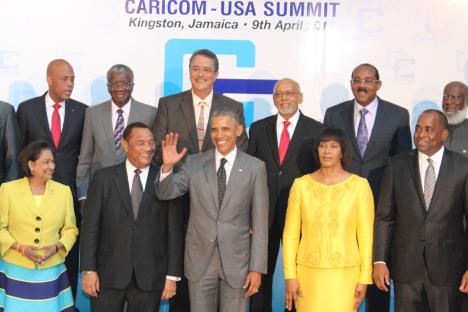It was a curious thing to see Jamaicans hailing Barack Obama on Thursday more like a returning “son of the soil” than a visiting president of the United States. Even more curious was seeing CARICOM leaders jostle like UWI students for a photo op.
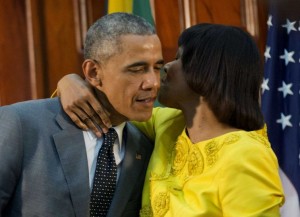 But don’t get me started on the way Jamaican Prime Minister Portia Simpson-Miller made such a public show of courting him as if he were her long lost love.
But don’t get me started on the way Jamaican Prime Minister Portia Simpson-Miller made such a public show of courting him as if he were her long lost love.
Alas, it falls to me, yet again, to disabuse my regional compatriots of their reflected glory. Not least because it speaks volumes that Obama planned this trip as little more than a stopover on his way to the Summit of the Americas in Panama.
More to the point, here is the admonition I sounded — in “Obama Elected U.S. President and World Celebrates ‘Change,’” November 7, 2008 — just seventy-two hours after his historic election.
___________________
Racial pride aside, those in the Caribbean who are heralding Obama’s election as the dawn of a new day in our relations with the United States are in for a rude awakening. After all, given the two wars, an unprecedented economic meltdown, and other priorities he has to contend with, chances are that the Caribbean will not even figure in President Obama’s consciousness during his first term; except perhaps when he’s fantasizing about a vacation from the daily grind of his presidency.
But even if he manages to turn his attention to us, it would probably only be to cripple our banking industry by closing ‘loopholes’ in the U.S. tax code that allow American corporations and wealthy individuals to avoid taxes. They do this, of course, by using the offshore accounts that define our tax-haven status and generate critical revenues for our regional economy.
On the other hand, we can retain hope that Obama will honor his promise to ‘normalize’ relations with Cuba.
___________________
And here is how I reinforced this admonition — in “Fifth Summit of the Americas: Managing Expectations,” April 17, 2009 — after Obama participated in his first summit.
___________________
It is noteworthy that, even though G-20 leaders met primarily to deal with the ongoing global financial crisis, dealing a blow to offshore banking in the Caribbean (and other tax havens) was their only notable accomplishment…
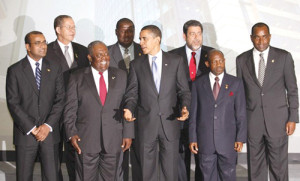 As much as President Obama seems prepared to listen to all grievances at this weekend’s Fifth Summit of the Americas in Trinidad and Tobago, only a fool would entertain hope that he will offer any change to soften this G-20 blow…
As much as President Obama seems prepared to listen to all grievances at this weekend’s Fifth Summit of the Americas in Trinidad and Tobago, only a fool would entertain hope that he will offer any change to soften this G-20 blow…
I urge CARICOM leaders to refrain from badgering him about lifting the 50-year embargo against Cuba. Instead, they would make a far more constructive contribution to this summit by announcing a date certain by which they will complete our 50-year effort to integrate our economies. Especially because this would give us a far more respected and influential voice in future discussions on hemispheric issues – from free trade to drug trafficking…
Besides, I am convinced that, if re-elected, Obama will seal his legacy by lifting the embargo and normalizing relations with Cuba. But, where I have advocated for this cause as a categorical imperative, I’m not sure CARICOM leaders fully appreciate what lifting the embargo augurs for our zero-sum regional economy. Be careful what you wish for…?
So, what’s the point of this Obama-centric summit?
Well, there is something to be said for welcoming the first Black president of the United States to our shores with open arms. But frankly, we shouldn’t expect much more than style and symbolism from Obama’s presidency.
Ironically, I suspect history will judge George W. Bush a far more helpful president to CARICOM countries – in terms of foreign aid and economic policies – than either Bill Clinton or Barack Obama.
___________________
The point is that one would be hard-pressed to cite any meaningful benefit that has redounded to member countries as a direct result of Obama’s policies. Not to mention that, during a town hall meeting in Jamaica, Obama betrayed the hollowness of his political interest in the Caribbean by citing the hackneyed parable about teaching people to fish, instead of giving them fish. After all, not only do we islanders know how to fish; citing a parable about removing all trade barriers to U.S. markets for our catch would’ve been more encouraging.
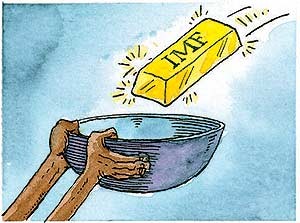 Moreover, pursuant to the Multilateral Debt Relief Initiative, the IMF and World Bank have doled out billions in debt forgiveness to sister countries like Ghana, Bolivia, and Nicaragua in recent years. Therefore, you’d think Simpson-Miller would’ve induced/seduced Obama to get these U.S.-led financial institutions to grant similar debt forgiveness to Jamaica. After all, this country’s economy has been wiggling in the quicksand of IMF-imposed austerity for decades, during which time the IMF has blithely extracted debt payments at the expense of its sustainable development.
Moreover, pursuant to the Multilateral Debt Relief Initiative, the IMF and World Bank have doled out billions in debt forgiveness to sister countries like Ghana, Bolivia, and Nicaragua in recent years. Therefore, you’d think Simpson-Miller would’ve induced/seduced Obama to get these U.S.-led financial institutions to grant similar debt forgiveness to Jamaica. After all, this country’s economy has been wiggling in the quicksand of IMF-imposed austerity for decades, during which time the IMF has blithely extracted debt payments at the expense of its sustainable development.
This is not the forum to delve any further. Instead, I highly recommend the documentary film Life and Debt, which the Guardian of London hailed (in its February 27, 2003, edition) as “incisive in its examination of how IMF and World Bank policies, determined by G-7 countries, led by the U.S., impact on poor countries.”
 But here is a teaser, courtesy of the Guardian’s review:
But here is a teaser, courtesy of the Guardian’s review:
The late Michael Manley, then the leftwing leader of the People’s National Party, who served two terms as prime minister in the 1970s, was rudely awoken to the realities of international finance. ‘In Washington they just looked at us and said, ‘No, no, no. Your inflation last year was 18% and we are not allowing you to lend to your farmers at 12%. You must charge 23%.’’
This brings me to the Seventh Summit of the Americas, which convened in Panama on Friday. Frankly, Obama’s handshake with Cuban President Raul Castro at the opening ceremony generated so much media coverage, you’d be forgiven for thinking that it was planned as the most important item on the summit’s agenda.
Unsurprisingly, in this age of Twitter, when most people have the political memory of hungry gnats, far too many reporters and pundits appeared to have forgotten Obama’s truly historic handshake with Castro at Mandela’s memorial in South Africa in December 2013. But you knew the media were more interested in style than substance when the following statement by Castro, which is as obvious as it is inconsequential, began competing with this handshake as the top news story of the summit:
‘I have told President Obama that I get very emotional talking about the revolution,’ Castro said through a translator, noting that Obama wasn’t even born when the U.S. began sanctioning the island nation. ‘I apologize to him because President Obama had no responsibility for this.’
(The Associated Press, April 11, 2015)
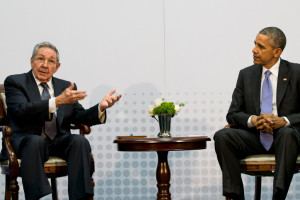 All the same, there’s no denying the importance of the United States not just allowing Cuba to attend this summit for the first time in its 20-year history, but also agreeing to a truly historic meeting between Obama and Castro to finalize terms for the ongoing process of normalizing relations. No doubt you recall the, well, revolutionary way they heralded this process in simultaneous addresses to their respective nations last December.
All the same, there’s no denying the importance of the United States not just allowing Cuba to attend this summit for the first time in its 20-year history, but also agreeing to a truly historic meeting between Obama and Castro to finalize terms for the ongoing process of normalizing relations. No doubt you recall the, well, revolutionary way they heralded this process in simultaneous addresses to their respective nations last December.
Reliable media reports indicate that Obama will announce, any day now, that he’s removing Cuba from America’s list of countries that sponsor terrorism. This, of course, is rather like a corrupt criminal justice system finally releasing a petty thief, who has been languishing on death row for over thirty years … for a murder he did not commit. Nonetheless, this means that Cuba will now be able to join, and benefit tremendously from, a host of international financial and political institutions.
But, in the shadows of media klieg lights, this summit will be marked far more by Obama’s determined intent to reclaim his country’s moral and political authority throughout the Americas, which both China and Venezuela have usurped, to varying degrees, in recent years.
Apropos of this, Obama took pains, during the aforementioned town hall meeting in Jamaica, to acknowledge the hegemonic, and often hypocritical, way America once exercised its superpower throughout the region. What’s more, he pledged that, henceforth, America’s economic largesse would come without paternalistic conditions, which seemed designed as much to impose cultural values as to stimulate economic growth.
This new approach will surely be music to the ears of leaders across the globe – who have not only been lapping up China’s largesse, but extolling its “no political interference” way of doing business.
Moreover, in some areas, Obama is already putting America’s money where his mouth is. For example, touting America’s newfound clout as the world’s biggest oil producer (as reported by in the July 4, 2014, edition of Bloomberg News), his trade officials have been aggressively pitching market-driven alternatives to Venezuela’s politically motivated PetroCaribe. PetroCaribe, you may know, is the cheap energy scheme the late Venezuelan President Hugo Chávez devised to buy political influence among the leaders of Caribbean countries.
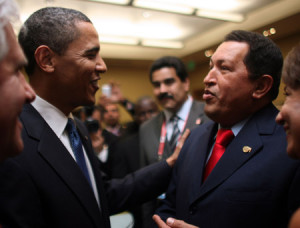 Except that the prophetic drop in the price of oil this year, coupled with chronic corruption, has left President Maduro’s Venezuela struggling to honor its obligations to supply cheap energy to its citizens, let alone to those Chávez co-opted abroad. The Wall Street Journal highlighted the looming crisis this portends in a December 5, 2014, headline as follows:
Except that the prophetic drop in the price of oil this year, coupled with chronic corruption, has left President Maduro’s Venezuela struggling to honor its obligations to supply cheap energy to its citizens, let alone to those Chávez co-opted abroad. The Wall Street Journal highlighted the looming crisis this portends in a December 5, 2014, headline as follows:
An Ailing Venezuela Trims Oil Diplomacy: Caracas Slashes Shipments of Discounted Crude to Its Partners in the Caribbean and Central America Who Depend Heavily on the Subsidies
Mind you, I saw PetroCaribe for the unsustainable diplomatic ploy it was from the outset – as this excerpt from “PetroCaribe: Let’s Look this Gift Horse in the Mouth,” June 30, 2006, duly attests.
__________________
PetroCaribe promises to ‘…contribute to the energy security, socioeconomic development and integration of the Caribbean countries, through the sovereign use of the energy resources.’
I am loath to suggest that Chávez is selling snake, not crude, oil. But I have grave misgivings – not only about the viability of PetroCaribe as an alternative to the FTAA, but also about its potential as a reliable source of ‘discounted’ energy for Caribbean countries.
Anyone who bothers to read the fine print will see that it’s less about regional energy and more about regional politics. And, I fear, Caribbean citizens who expect PetroCaribe to deliver a steady supply of cheap fuel are bound to be disappointed. After all, there’s nothing in this agreement that provides such a guarantee.
__________________
Still, Obama has a lot of catching (and making) up to do – as this excerpt from the New York Times, “China Buys Inroads in the Caribbean, Catching U.S. Notice,” April 7, 2012, makes abundantly clear.
___________________
A brand new $35 million stadium opened here in the Bahamas a few weeks ago, a gift from the Chinese government…
Dominica has received a grammar school, a renovated hospital and a sports stadium … Antigua and Barbuda got a power plant and a cricket stadium, and a new school is on its way…
China’s economic might has rolled up to America’s doorstep in the Caribbean, with a flurry of loans from state banks, investments by companies and outright gifts from the government in the form of new stadiums, roads, official buildings, ports and resorts in a region where the United States has long been a prime benefactor.
______________________
Except that, here again, I had already been trying for years to get the United States to take notice. More than that, though, I had been trying to get Caribbean countries to appreciate that the conditions China places on its financial investments could undermine their sovereignty every bit as much as the conditions the United States placed on its financial aid.
Here, for example, is what I posited in “China Buying Up Political Dominion in the Africa, Latin America, and the Caribbean,” February 22, 2005:
What happens if China decides that it is in its strategic national interest to convert the container ports, factories and chemical plants it has funded throughout the Caribbean into dual military and commercial use? Would these governments comply? Would they have any real choice? And when they do comply, would the U.S. then blockade the entire region – as it blockaded Cuba during the missile crisis?
Now, consider China making such strategic moves in Latin America or Africa where its purportedly benign Yuan diplomacy dwarfs its Caribbean operations. This new Cold War could then turn very hot indeed….
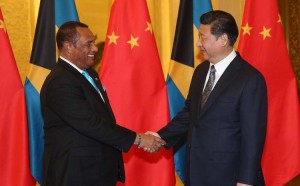 And here is how I felt constrained to comment just five years later in “China Putting Squeeze on The Bahamas. Your Country Could Be Next,” October 22, 2010:
And here is how I felt constrained to comment just five years later in “China Putting Squeeze on The Bahamas. Your Country Could Be Next,” October 22, 2010:
China is demanding that this small Caribbean nation issue permits for 8,150 foreign workers, which would amount to 71% of the labor force needed for this project; notwithstanding that The Bahamas is teeming with unemployed men (and women) who are willing and able to do the work.
Of course, for over a decade now, China has been buying up influence throughout the Caribbean to enable it to exercise its economic, political, and, perhaps, even military power to further its national interests without question … let alone challenge. And nothing demonstrated its modus operandi in this respect quite like the way it allegedly bribed (or attempted to bribe) every nation in the region to sever ties with Taiwan: almost all of them, including The Bahamas, duly complied.
But the leaders of every one of these nations knew, or should have known, that, sooner or later, China would seek to use its influence in ways that were inimical to their national interests…
To those who may have thought that China would be a more benign hegemon than the U.S., I offer [this] instructive cliché: better the devil you know than the devil you don’t.
In the meantime, it’ll be interesting to see if the United States can defeat/bankrupt China in their burgeoning superpower battle to buy political influence in countries throughout the Americas (and across the globe) with infrastructure investments. You know, the way it defeated/bankrupted the Soviet Union in their superpower battle to buy similar influence with military armaments. Clearly the latter could prove far more salutary for developing countries.
And, given the precedent the Cuban missile crisis triggered, it’ll be particularly interesting to see if Cuba aligns itself more with China (as a substitute Sugar Daddy for the former Soviet Union) than with the United States.
NOTE: You’ve probably heard Republicans yelping about Congress retaining ultimate authority to lift the embargo. But Obama enjoys such comprehensive authority to constructively engage Cuba that, by the time he leaves office, formally lifting the embargo is likely to be anticlimactic/symbolic at best.
Related commentaries:
Obama elected…
Fifth Summit of Americas…
PetroCaribe…
China putting squeeze…
